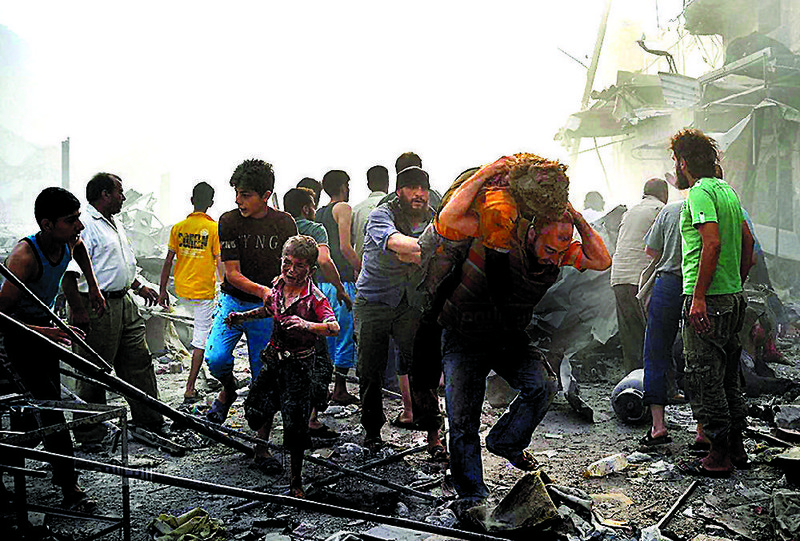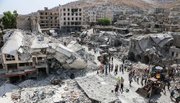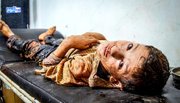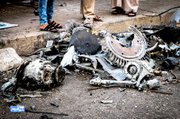WASHINGTON -- The U.S. military is expanding its combat role in Syria in defense of coalition-backed rebels, conducting armed drone missions into Syria from an air base in Turkey and imposing new rules allowing the U.S. to defend rebels against attacks from any hostile force, including the Assad government.
The first armed drone missions out of Turkey began during the weekend, and the military is planning to add manned aircraft flights, U.S. officials said.
None of the drones has launched airstrikes, but Navy Capt. Jeff Davis, a Pentagon spokesman, said they may begin conducting strikes soon. He said the U.S. also will likely fly search-and-rescue missions from Incirlik Air Base in Turkey.
The use of the Incirlik base comes as the U.S. began launching airstrikes to defend U.S.-backed Syrian rebels when they come under fire from forces other than Islamic State militants. Davis said that on Friday, the U.S. used strikes to defend rebels who were attacked by the Nusra Front, al-Qaida's branch in Syria.
Under previous guidelines, U.S. forces could only conduct offensive missions against the Islamic State, and they couldn't go after other groups such as Syrian government forces, largely due to worries it would set off war with Syria.
But U.S. officials in recent weeks have walked a careful line, arguing that they have an obligation to defend the Syrian rebels who have been trained by the U.S. to help battle the Islamic State. Under the new rules, the U.S. can defend the rebels if they come under fire from government forces or any other group, such as the Nusra Front. But American forces still can't launch offensive missions against those other groups.
"I am pleased that the administration has finally decided to provide additional military support to the Syrian forces the Department of Defense is training and equipping to counter ISIL in northern Syria," said Sen. John McCain, using an acronym for the extremist group that has overtaken parts of Syria and Iraq. But the Arizona Republican expressed concern about "a policy of gradual escalation that has plagued U.S. efforts since the start of the conflict in Syria."
Davis declined to provide details on the new rules of engagement for the military, including what conditions have to exist before the U.S. can defend the Syrian rebels and whether strikes would be limited to instances when only U.S.-trained rebels are at risk.
Syrian President Bashar Assad last month acknowledged that his troops have lost territory to rebel forces and were running short on manpower, but he vowed that he would win the long-running civil war.
Until now, the U.S.-backed campaign against the Islamic State has aligned with Assad's interests because he also wants to defeat the insurgents. As a result, his government forces have not interfered with any of the coalition aircraft launching strikes against the Islamic State. But the U.S.' plan to back the moderate rebels if they come under fire by regime forces could increase that risk and fuel opposition from other countries.
Russian Foreign Minister Sergey Lavrov, speaking after a meeting with Secretary of State John Kerry and Saudi Foreign Minister Adel al-Jubeir, criticized U.S.-led efforts to train members of the Syrian opposition to fight inside the country and called for an end to "foreign intervention" in the Syria crisis.
Kremlin spokesman Dmitry Peskov said Russia has "repeatedly underlined that help to the Syrian opposition, moreover financial and technical assistance, leads to further destabilization of the situation in the country."
As part of U.S. training efforts, a program that began in May was envisioned to prepare 5,400 Syrians for an anti-Islamic State mission, but a dearth of volunteers free of extremist links has kept the number of recruits to 60.
An editorial carried by Russia's official Tass news agency quoted political analysts as accusing President Barack Obama of authorizing air support for Syrian rebels to cover up the failure of the training mission, whose chief recruiter in Syria has reportedly been captured by the Islamic State.
"Obama said the United States would provide defensive fire to support the Syrian opposition for the sole reason he would like to save face in the wake of the utter failure of the program for training Syrian rebels and the arrest of the recruiter," Middle East Institute chief Yevgeny Satanovsky told the news agency.
Civilian deaths alleged
The U.S. is leading a coalition against the Islamic State in Iraq and Syria. On Monday, a report by an independent monitoring group said airstrikes against the militants have likely killed at least 459 civilians over the past year.
The report by Airwars, a project that tracks the international airstrikes targeting the extremists, said it believed 57 strikes killed civilians and caused 48 suspected "friendly fire" deaths. It said the strikes have killed more than 15,000 Islamic State militants.
While Airwars noted the difficulty of verifying information in territory held by the Islamic State, which has kidnapped and killed journalists and activists, other groups have reported similar casualties from the U.S.-led airstrikes.
"Almost all claims of noncombatant deaths from alleged coalition strikes emerge within 24 hours -- with graphic images of reported victims often widely disseminated," the report said.
"In this context, the present coalition policy of downplaying or denying all claims of noncombatant fatalities makes little sense, and risks handing [the] Islamic State and other forces a powerful propaganda tool."
The U.S. began the airstrikes in Iraq on Aug. 8 and in Syria on Sept. 23. A coalition of countries later joined to help allied ground forces combat the extremists. To date, the coalition has launched more than 5,800 airstrikes in the countries.
The U.S. has only acknowledged killing two civilians in its strikes: two children who likely died during an American airstrike targeting al-Qaida-linked militants in Syria last year. That strike also wounded two adults, according to an investigation released in May by the U.S. military.
U.S. Army Col. Wayne Marotto, a spokesman for the coalition, did not address the report directly but said "there is no other military in the world that works as hard as we do to be precise."
"When an allegation of civilian casualties caused by Coalition forces is determined to be credible, we investigate it fully and strive to learn from it so as to avoid recurrence," he said in a statement.
Warplane crashes
Meanwhile, air raids by the Syrian government in a northwestern town and a subsequent crash of a Syrian warplane in a residential area killed at least 27 people Monday, activists said.
The raids on the town of Ariha came amid clashes between government forces and insurgents in the northwestern province of Idlib and the central region of Hama. The town, once a government stronghold, was captured by opposition fighters and Islamic militants in May. Government forces have suffered setbacks in Idlib province since March, including the loss of the provincial capital.
An activist group known as the Local Coordination Committees said the warplane crashed in a busy market, adding that it was not immediately clear whether it was shot down. The group said 27 people were killed and many others were wounded.
Rami Abdurrahman, who leads the Britain-based Syrian Observatory for Human Rights, said the plane crashed in the town center, destroying several homes. The Observatory later said that 31 people were killed and more than 60 were wounded.
The discrepancies in the casualty figures could not be reconciled.
Also on Monday, the U.S. Treasury Department targeted 11 companies and individuals suspected of providing energy products the Syrian government is using in the conflict.
The Treasury Department said many of those targeted have been used to evade U.S. and European Union sanctions.
Monday's action freezes any assets the entities have in U.S. jurisdiction and prohibits Americans from doing business with them.
The companies sanctioned are: The Eagles, based in Syria; Morgan Additives Manufacturing Co., based in Dubai; Milenyum Energy, which is registered in Panama and operates in Turkey; Blue Energy, which is registered in St. Kitts and Nevis; Elba Trade, based in Beirut; and Green Shipping Ltd. and Aqua Shipping Ltd., which also operate from Turkey. The four individuals sanctioned are employed by Milenyum.
Information for this article was contributed by Lolita C. Baldor, Adam Schreck, Sagar Meghani, Bassem Mroue, Vivian Salama, Zeina Karam, Salar Salim and staff members of The Associated Press; and by Carol J. Williams of the Los Angeles Times.
A Section on 08/04/2015






